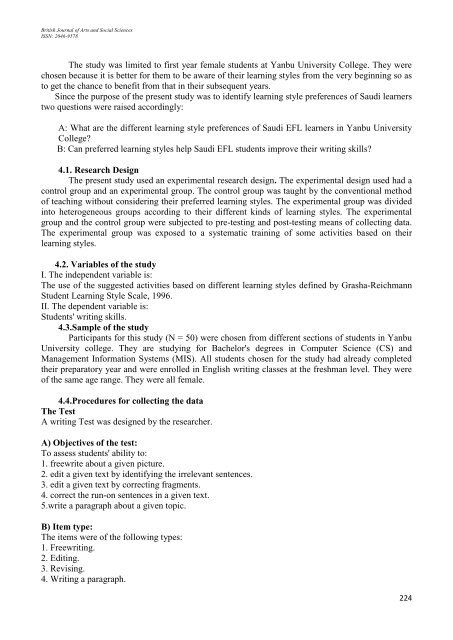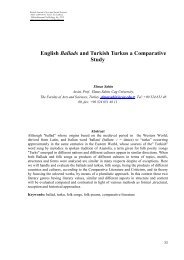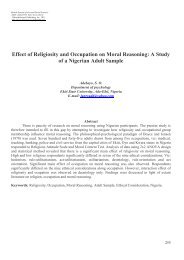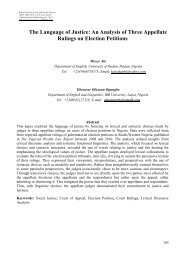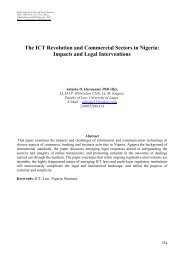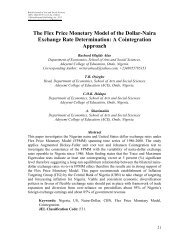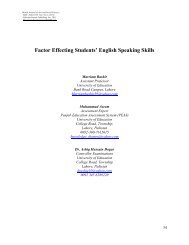The Effect of Different Learning Styles on Developing Writing Skills ...
The Effect of Different Learning Styles on Developing Writing Skills ...
The Effect of Different Learning Styles on Developing Writing Skills ...
You also want an ePaper? Increase the reach of your titles
YUMPU automatically turns print PDFs into web optimized ePapers that Google loves.
British Journal <str<strong>on</strong>g>of</str<strong>on</strong>g> Arts and Social Sciences<br />
ISSN: 2046-9578<br />
<str<strong>on</strong>g>The</str<strong>on</strong>g> study was limited to first year female students at Yanbu University College. <str<strong>on</strong>g>The</str<strong>on</strong>g>y were<br />
chosen because it is better for them to be aware <str<strong>on</strong>g>of</str<strong>on</strong>g> their learning styles from the very beginning so as<br />
to get the chance to benefit from that in their subsequent years.<br />
Since the purpose <str<strong>on</strong>g>of</str<strong>on</strong>g> the present study was to identify learning style preferences <str<strong>on</strong>g>of</str<strong>on</strong>g> Saudi learners<br />
two questi<strong>on</strong>s were raised accordingly:<br />
A: What are the different learning style preferences <str<strong>on</strong>g>of</str<strong>on</strong>g> Saudi EFL learners in Yanbu University<br />
College?<br />
B: Can preferred learning styles help Saudi EFL students improve their writing skills?<br />
4.1. Research Design<br />
<str<strong>on</strong>g>The</str<strong>on</strong>g> present study used an experimental research design. <str<strong>on</strong>g>The</str<strong>on</strong>g> experimental design used had a<br />
c<strong>on</strong>trol group and an experimental group. <str<strong>on</strong>g>The</str<strong>on</strong>g> c<strong>on</strong>trol group was taught by the c<strong>on</strong>venti<strong>on</strong>al method<br />
<str<strong>on</strong>g>of</str<strong>on</strong>g> teaching without c<strong>on</strong>sidering their preferred learning styles. <str<strong>on</strong>g>The</str<strong>on</strong>g> experimental group was divided<br />
into heterogeneous groups according to their different kinds <str<strong>on</strong>g>of</str<strong>on</strong>g> learning styles. <str<strong>on</strong>g>The</str<strong>on</strong>g> experimental<br />
group and the c<strong>on</strong>trol group were subjected to pre-testing and post-testing means <str<strong>on</strong>g>of</str<strong>on</strong>g> collecting data.<br />
<str<strong>on</strong>g>The</str<strong>on</strong>g> experimental group was exposed to a systematic training <str<strong>on</strong>g>of</str<strong>on</strong>g> some activities based <strong>on</strong> their<br />
learning styles.<br />
4.2. Variables <str<strong>on</strong>g>of</str<strong>on</strong>g> the study<br />
I. <str<strong>on</strong>g>The</str<strong>on</strong>g> independent variable is:<br />
<str<strong>on</strong>g>The</str<strong>on</strong>g> use <str<strong>on</strong>g>of</str<strong>on</strong>g> the suggested activities based <strong>on</strong> different learning styles defined by Grasha-Reichmann<br />
Student <str<strong>on</strong>g>Learning</str<strong>on</strong>g> Style Scale, 1996.<br />
II. <str<strong>on</strong>g>The</str<strong>on</strong>g> dependent variable is:<br />
Students' writing skills.<br />
4.3.Sample <str<strong>on</strong>g>of</str<strong>on</strong>g> the study<br />
Participants for this study (N = 50) were chosen from different secti<strong>on</strong>s <str<strong>on</strong>g>of</str<strong>on</strong>g> students in Yanbu<br />
University college. <str<strong>on</strong>g>The</str<strong>on</strong>g>y are studying for Bachelor's degrees in Computer Science (CS) and<br />
Management Informati<strong>on</strong> Systems (MIS). All students chosen for the study had already completed<br />
their preparatory year and were enrolled in English writing classes at the freshman level. <str<strong>on</strong>g>The</str<strong>on</strong>g>y were<br />
<str<strong>on</strong>g>of</str<strong>on</strong>g> the same age range. <str<strong>on</strong>g>The</str<strong>on</strong>g>y were all female.<br />
4.4.Procedures for collecting the data<br />
<str<strong>on</strong>g>The</str<strong>on</strong>g> Test<br />
A writing Test was designed by the researcher.<br />
A) Objectives <str<strong>on</strong>g>of</str<strong>on</strong>g> the test:<br />
To assess students' ability to:<br />
1. freewrite about a given picture.<br />
2. edit a given text by identifying the irrelevant sentences.<br />
3. edit a given text by correcting fragments.<br />
4. correct the run-<strong>on</strong> sentences in a given text.<br />
5.write a paragraph about a given topic.<br />
B) Item type:<br />
<str<strong>on</strong>g>The</str<strong>on</strong>g> items were <str<strong>on</strong>g>of</str<strong>on</strong>g> the following types:<br />
1. Freewriting.<br />
2. Editing.<br />
3. Revising.<br />
4. <strong>Writing</strong> a paragraph.<br />
222


